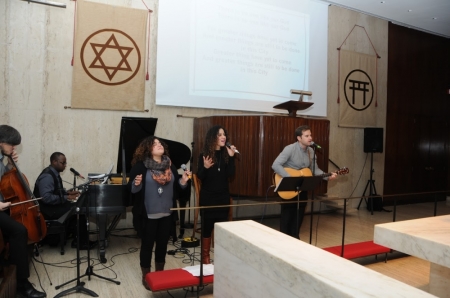Evangelical Leaders Look to Prevent the Deaths of 300,000 Women in Child Birth Each Year at Micah Summit; Reflect on World Poverty Being Reduced by 50 Percent

NEW YORK — The Micah Summit, an event that reflects on the progress of the Millennium Declaration made by the U.N. in 2000, which vowed to solve issues in the world such as poverty and hunger, hosted its Celebration and Sorrow event at the Church Center in New York City last week.
The event was held to celebrate the achievements of some of the Millennium Development Goals, or MDGs, in the last 14 years and to reflect on the work that still needs to be done throughout the world.
"Over the last generation, 25 years we have actually reduced extreme poverty by 50 percent, that's to celebrate. The churches, Christian NGOs, Christian movements, individuals are hugely impacting things. We want to celebrate that," said Joel Edwards, chairman of Micah Challenge, the organization that sponsored the event, to The Christian Post last Tuesday. . "But we still want to say it's not good enough — that a billion people still live in extreme poverty, 300,000 women die in child birth every year, kids are still not being schooled, women are still being raped as weapons of war, and that's not good. We want to express lamentation over that."
He also explained the purpose of the Celebration and Sorrow event in more detail.
"Celebration and Sorrow is basically a chance to kind of rewind and look at how the world has performed in relation to its promises to half extreme poverty by 2015," Edwards continued. "We wanted to stop and rewind a bit [and see] how we have done, what's been done well and what we've not done so well. We want to celebrate the good things, and as Christians, to ask ourselves where have we fallen short."
The event featured some worship music and several speakers, including Edwards himself. Some of which showed statistics of the impact made by the U.N., Micah Challenge and other organizations, such as the World Evangelical Alliance on extreme world poverty.
Edwards explained how 189 nations vowed to end extreme poverty in the year 2000 and showed a statistic that by 2010 it had gone down by 21 percent.
Geoff Tunnicliffe, the CEO of the World Evangelical Alliance, also shared some of the progress made by countries partnering with Micah Challenge and told the story of a company started in Boise, Idaho, that aggregates the businesses of women around the world to sell their products through Walmart. The effort has helped to create even more income for women who lacked the proper training.
He also explained the new role that the media could play in helping Evangelicals engage the poor.
"The hope for me, for the media, is that they will tell the transformative stories that are taking place, whether it's in parts of Africa or in Latin America, Asia or even the cities of the U.S. that will never make the front pages," Tunnicliffe told CP.
He believes the media, which also includes film and television, could inspire change by telling good news stories and said it's an "untapped resource" at this time.
Edwards shared some of these stories that should be celebrated while also mentioning some of the problems in the world that still need to be dealt with by Christians and countries throughout the world. He hoped to motivate those in attendance to challenge world governments and groups to fix these problems by engagement.
The Micah Summit was an event which spanned two days. Celebration and Sorrow functioned as a cap off to the week's festivities and allowed a large crowd of U.N. representatives to examine the progress that has been made since 2000, and what still needs to be done in the world.





















